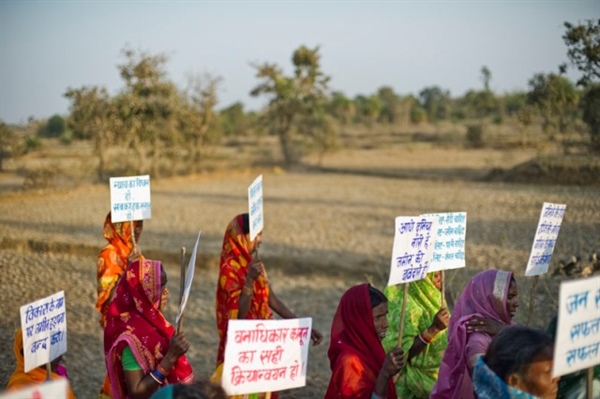
Globalization and its impact can be seen and felt in every nook and corner of India. Adivasis have already lost their control over land, forest and water as the mining industries are aggressively moving into their regions. Farmers are losing their land everyday for industrialization and infrastructural development. Water sources are drying up as the cities are demanding more water and the industries are sucking up every drop of water. Rivers are completely polluted by sewage from cities and effluents from factories. Of course this is one side of the picture. Promoters and propagators of the present day development paradigm will show the other side where everything is glittery. Ekta Parishad critiques this model of development and as a result is focused on resisting globalization through action at the grassroots.
Ekta Parishad begins its work from a statement of Mahatma Gandhi where he says “the focus of all your activities should be poorest and weakest” and his larger philosophy of Sarvodaya is about building a bottom-up socio-political-economic order that puts the well-being of the last as the first priority. This is the driving philosophy whereby we want to begin at the bottom and slowly empower and organize people socially, politically and economically. Ekta Parishad has adopted a two-fold strategy in its approach. On the one side, we are trying to resist the onslaught of global forces through struggle and dialog and on the other hand we are constantly in a process of coordinating and strengthening the economy of the people so that they can make a living based on their skills, capacities and resources without migrating into cities and slums. A statement like this may sound easy but it is an ongoing battle almost everyday.
Having worked at the national level for policy change for so many years, we now feel that a lot more energy needs to be spent at the grassroots level to create the economic power that will allow people to stay on and resist. This is the thinking behind our strategy “Back to the Roots” This strategy was adopted also because of the impact of our struggles: many people have got control over land as a result of policy shift at the top. Hence retaining the land, developing the land and making it productive enough in a sustainable way is the next stage of our struggle. To advance this agenda we have created an Arthik Manch or Economic Forum, which is a forum that focuses on the economic dimension of rural India. The forum is now exploring various possibilities like strengthening the economy through land related activities, forest and forest produce related activities and also cottage industry based activities.
There is an interesting realization in the organization that it is not only important to create wealth but also important to plug the leakage of money from villages i.e., the money that is leaving the village due to consumption of unnecessary goods. In the coming days, Ekta Parishad will be conducting important studies in relation to plugging leakages. We have also realized that there is a lot of limitation if we want to play in the market place. Market being so aggressive, every penny that people earn, gets spent on items that may not be their real need but are perceived as important needs. The desire to show the world that we are advancing by acquiring objects that are not necessarily based on need but are based on greed and to establish a social standing is causing money to go out of the village. We know that this is a deeper area of analysis and in a world where media is powerful and television has reached every village it will be difficult for most people to truly understand this. We believe that it is only through greater levels of understanding and enlightenment, we can really plug the outflow of money from the villages.
Arthik Manch will be working on 3 levels:
- providing necessary resources, skills and capacities to organize the village economy based on local resources and local capacities
- empowering people to understand the need and methods to plug the leakage
- to have a greater understanding of global economy and market forces and think of strategies to deal with it.
We believe that if we are able to work at these three levels, we will be able to introduce the idea of local currency. The larger goal of this process is to strengthen Localization to resist Globalization. Even though Mahatma Gandhi spoke about this in his idea of Gram Swaraj (Village Autonomy), these ideas are today finding greater acceptance and resonance in the international development discourse.

Criticizing global process or analyzing global process will have its own place but what is more important is to strengthen local economy and help people to resist the global process in order to protect their own social, cultural, economic and political freedom and space. In the coming years, Ekta Parishad would like to work in this direction. At the moment, we are exploring partnerships with as many organizations and individuals who are interested in this process. The idea of localization process gives tremendous scope for all kinds of organizations and individuals to get involved: localization of education, food, culture, agriculture, industry etc. Each one can find a field according to their interest and Ekta Parishad would like to keep our doors open for all kinds of experimentations.
Photo credits: Ekta Parishad website (archive)
First Published on Ekta Parishad website (archive)
Books, Reports and Newsletters on Economics & Technologies published by Ekta Parishad and others on this website